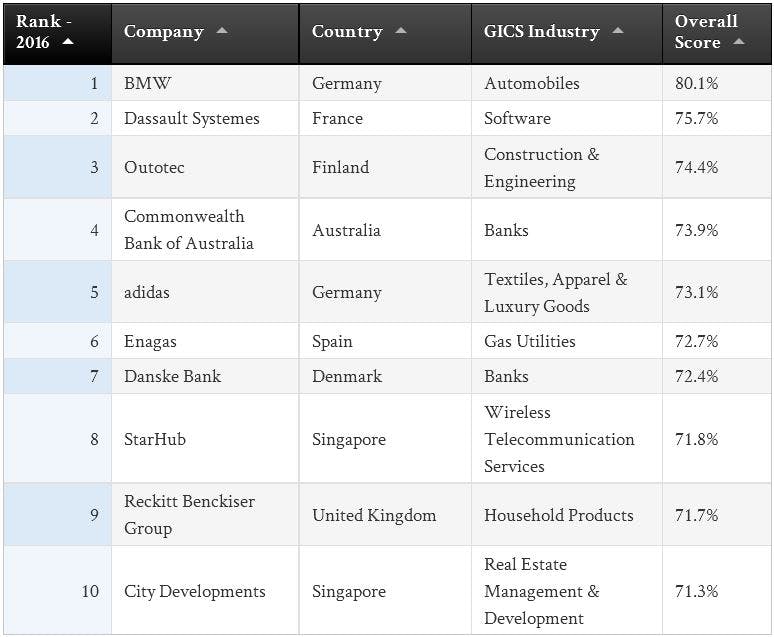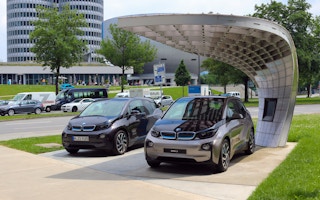German automobile giant BMW has been ranked as the most sustainable company in the world, according to the Global 100 Most Sustainable Corporations index unveiled by Canadian media and research firm Corporate Knights in Davos, Switzerland on Thursday.
Singapore, a small city-state in Asia, punched above its weight with two firms - telecommunications provider StarHub and real estate giant City Developments Limited (CDL) - claiming spots among the top 10.
The index was launched on the sidelines of the World Economic Forum’s annual meeting in Davos, where global business, civil society, and policy leaders have gathered to discuss financial and social challenges facing the global economy.
The ranking showcases the top corporations that are leading on sustainability, which has become an important priority among government and business leaders in recent years.
Last month, at the United Nations climate change summit in Paris, businesses also pledged an unprecedented number of commitments ranging from moves by institutional investors to rid their portfolios of fossil fuels to promises by companies to integrate carbon pricing into operations, all in a bid to tackle climate change.
Toby Heaps, chief executive officer of Corporate Knights noted that the Global 100 companies “demonstrate ambition and achievement on a broad spectrum of indicators”.
“Striving to make the world a better place, they are where people want to work, firms we want to buy from and invest in for the long term”, he added.

The top 10 companies in the Global 100 2016 ranking. Image: Corporate Knights
BMW won the top spot thanks to a strong performance in areas such as energy and resource efficiency, as well as waste minimisation.
It also won praise for its transparent approach to paying taxes, its high investment in innovation, low employee turnover, and a small disparity between the pay of top management and average workers.
Harald Kruger, chairman of the BMW board of management, said: “Sustainability is part of our identity… (the ranking) shows that our activities continue to have an impact and that we are on the right track.”
The index assessed 4,353 publicly listed companies with a market capitalisation of more than US$2 billion. It uses 12 indicators to evaluate the companies, including energy use, taxes paid, and gender equality in top management.
One particularly encouraging finding from this year’s ranking was that 87 out of the 100 firms in the index provide a monetary bonus to executives if they achieve their sustainability targets, said Corporate Knights.
“
Striving to make the world a better place, they are where people want to work, firms we want to buy from and invest in for the long term.
Toby Heaps, chief executive officer, Corporate Knights
Asia Pacific shines bright
The 2016 index was also Asia Pacific’s strongest showing yet, with three firms from the region in the top 10, compared to just one last year. Apart from Starhub and CDL, the third was the Commonwealth Bank of Australia, which came in fourth.
Property developer Capitaland (93) and industrial conglomerate Keppel Corporation (55) were the other Singaporean firms featured, bringing the country’s total to four – the same as last year.
From Asia, Japan and South Korea also had four companies each listed in the ranking, including car maker Nissan Motors (97) and technology firm Samsung Electronics (94).
StarHub is the top Singaporean and Asian company on the index, its 8th place spot a sharp rise from 24th rank last year. Among the company’s sustainability initiatives are an islandwide campaign to recycle electronic waste, in-house resource efficiency targets, and sustainability reporting.
Tan Tong Hai, chief executive officer, StarHub, said that “it has always been important to us to do what is right for the business, community, and environment”.
CDL also jumped from 34th position last year to 10th-place. This, said Grant Kelley, chief executive officer of CDL, “reflects our concerted efforts of integrating sustainability into operations”.
The firm has made significant energy and water savings over the years and also reduced its greenhouse gas emissions by 21 per cent between 2007 and 2014. It has also won acclaim for sustainable projects such as Tampines Concourse 11, Asia Pacific’s first carbon neutral development and Tree House, a residential complex which is home to the world’s largest vertical garden.
As for the Commonwealth Bank of Australia, Corporate Knights said the bank won because of its transparent reporting on taxes, the status of its pension fund, and carbon emissions; as well as a gender equality target to have 40 per cent of senior management comprised of women by 2020. Today, 35 per cent of the bank’s top executives are women.
Kylie Macfarlane, general manager of corporate social responsibility, Commonwealth Bank, noted that the diversity of indicators for the scorecard ensures that every aspect of the bank’s business operations is considered in the assessment.
“Our corporate responsibility strategy guides us in achieving our vision to excel and securing and enhancing the financial wellbeing of people, businesses, and communities,” she said.

















